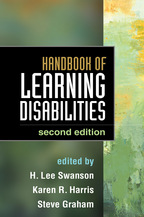Handbook of Learning Disabilities
Second Edition
Edited by H. Lee Swanson, Karen R. Harris, and Steve Graham
HardcoverPaperbacke-bookprint + e-book
Hardcover
orderFebruary 14, 2013
ISBN 9781462508495
Price: $110.00 716 Pages
Size: 7" x 10"
Paperback
orderAugust 13, 2014
ISBN 9781462518685
Price: $73.00 716 Pages
Size: 7" x 10"
Online-only color figures: View Figs. 17.1 and 17.2
Sign up for emails on upcoming titles by Steve Graham (with special discounts)!
Sign up for emails on upcoming titles by Steve Graham (with special discounts)!
“This handbook is a useful resource for both those who are experienced in the field as well as those who are new to it. It is an excellent reference for any practitioner's library since it provides such a thorough overview of the LD field, and it would also serve well as a text for an introductory course in LD in teacher training programs.”

—Educational Review
“Swanson, Harris, and Graham accomplish an impressive feat with their handbook. They compile chapters by the most preeminent scholars in the field to create a text that is both comprehensive and accessible.”

—Education Libraries
“This volume provides a remarkable articulation of the LD field as both legitimate and worthy of study. Summing Up: Essential. Upper-division undergraduates and above.”

—Choice
“This text is a gathering of the great minds on learning disability....It should be present in every university library and will prove a very worthy text for postgraduate courses on learning disability....Excellent.”

—Australian Journal of Learning Disabilities
“An exceptionally solid and comprehensive volume from leading scholars in the field. The second edition presents major research findings characterized by increased scientific rigor and an integrative perspective, bringing together neuroscience, genetics, and behavior. Chapters consistently rely on an operational definition of learning disabilities that does not reflect discrepancy notions. This handbook should be required reading for school psychologists, graduate students, and LD researchers.”

—James E. Ysseldyke, PhD, Birkmaier Professor, Department of Educational Psychology, University of Minnesota
“Swanson, Harris, and Graham offer a comprehensive examination of LD that reflects the multidisciplinary nature of the field. They bring together researchers whose work addresses conceptual, neurological, instructional, and methodological trends and issues. The second edition provides up-to-date coverage of legal aspects of service delivery, as well as notable new chapters on single-case designs, the state of the science in LD, adults with LD, and more. This volume is well suited as a course text or professional reference.”

—Diane Pedrotty Bryant, PhD, Department of Special Education and Meadows Center for Preventing Educational Risk, University of Texas at Austin
“The chapters in this volume offer an authoritative summary and analysis of core issues related to theory and practice in the LD field. The book should be required reading for all advanced students in the field. It is an indispensable graduate text and resource for scholars.”

—C. Addison Stone, PhD, School of Education (Emeritus), University of Michigan
“The Handbook has been the go-to source for a reliable, scholarly, in-depth treatment of major topics in the LD field for the past decade. Much has changed during this period, however, and the second edition is timely and welcome. New topics such as RTI and computer-based approaches to instruction are introduced and older topics—such as the preeminence of phonologic processing in successful reading—are revisited. This volume is an essential addition to the reference libraries of advanced students and clinical professionals alike.”

—Deborah P. Waber, PhD, Department of Psychiatry, Boston Children’s Hospital and Harvard Medical School
—Educational Review
“Swanson, Harris, and Graham accomplish an impressive feat with their handbook. They compile chapters by the most preeminent scholars in the field to create a text that is both comprehensive and accessible.”
—Education Libraries
“This volume provides a remarkable articulation of the LD field as both legitimate and worthy of study. Summing Up: Essential. Upper-division undergraduates and above.”
—Choice
“This text is a gathering of the great minds on learning disability....It should be present in every university library and will prove a very worthy text for postgraduate courses on learning disability....Excellent.”
—Australian Journal of Learning Disabilities
“An exceptionally solid and comprehensive volume from leading scholars in the field. The second edition presents major research findings characterized by increased scientific rigor and an integrative perspective, bringing together neuroscience, genetics, and behavior. Chapters consistently rely on an operational definition of learning disabilities that does not reflect discrepancy notions. This handbook should be required reading for school psychologists, graduate students, and LD researchers.”
—James E. Ysseldyke, PhD, Birkmaier Professor, Department of Educational Psychology, University of Minnesota
“Swanson, Harris, and Graham offer a comprehensive examination of LD that reflects the multidisciplinary nature of the field. They bring together researchers whose work addresses conceptual, neurological, instructional, and methodological trends and issues. The second edition provides up-to-date coverage of legal aspects of service delivery, as well as notable new chapters on single-case designs, the state of the science in LD, adults with LD, and more. This volume is well suited as a course text or professional reference.”
—Diane Pedrotty Bryant, PhD, Department of Special Education and Meadows Center for Preventing Educational Risk, University of Texas at Austin
“The chapters in this volume offer an authoritative summary and analysis of core issues related to theory and practice in the LD field. The book should be required reading for all advanced students in the field. It is an indispensable graduate text and resource for scholars.”
—C. Addison Stone, PhD, School of Education (Emeritus), University of Michigan
“The Handbook has been the go-to source for a reliable, scholarly, in-depth treatment of major topics in the LD field for the past decade. Much has changed during this period, however, and the second edition is timely and welcome. New topics such as RTI and computer-based approaches to instruction are introduced and older topics—such as the preeminence of phonologic processing in successful reading—are revisited. This volume is an essential addition to the reference libraries of advanced students and clinical professionals alike.”
—Deborah P. Waber, PhD, Department of Psychiatry, Boston Children’s Hospital and Harvard Medical School



